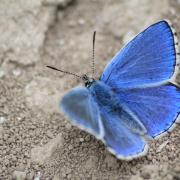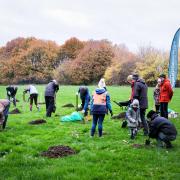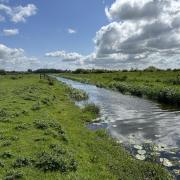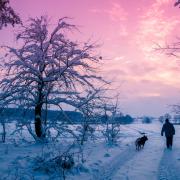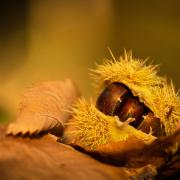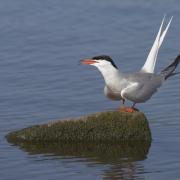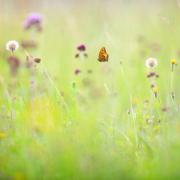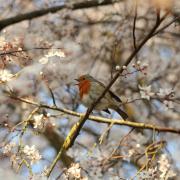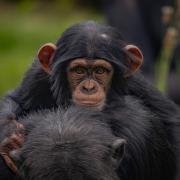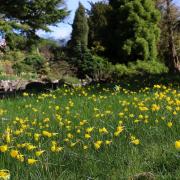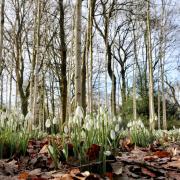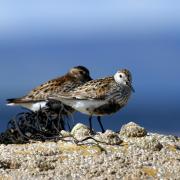The need to protect our natural world is more urgent than ever, says Martin Varley, director of operations at Cheshire Wildlife Trust

I saw a cartoon recently reflecting life in lockdown; it was divided into two parts. The upper half was labelled 2019, and depicted a zoo. A group of people were looking into an enclosure of animals. The lower picture, labelled 2020, was reversed with the animals on the outside and people shown self-isolating inside the enclosure.
This is very much a picture of the natural world during this extraordinary spring. As we have been forced to retreat to the four walls of our homes, wildlife has boldly gone where it has seldom been seen before. Goats in Llandudno, wild boar in Barcelona, birdsong resonating in Wuhan and dolphins in Cagliari: as one Italian tweeted: “Nature just hit the reset button”. There is a huge resilience in nature to restore itself, which gives a lot of hope, and we need this if we are to defeat the double jeopardy of the climate and nature crises, which still loom over us. The current pandemic is centre stage, but is short term. The spectre of the loss of half the world’s wildlife, or the impact of 30C temperatures by 2050 has lasting consequences for us all.
This year was supposed to be a super year for the environment. Important decisions about global plans for climate and biodiversity are to be made. Nations will finalise the plan for nature’s recovery over the next decade at a UN summit in China in October. The draft plan involves protecting nearly a third of the world’s oceans and land, as well as reaching no net loss by 2030 in the area and integrity of freshwater, marine and terrestrial ecosystems. In the UK our own Environment Bill, which has huge potential to be good for nature, is slowly progressing through parliament.
But there is a risk that these international negotiations will become another victim of coronavirus. Even if these talks go ahead, some believe the vital momentum needed to make the radical changes necessary to bring wildlife back that has already been lost. Last year’s climate strikes and Extinction Rebellion protests brought large numbers of people together. Their message led to politicians across the world making unprecedented commitments to act for our world. However, social distancing has quickly extinguished these flames of collective action.

So where does that leave nature in Cheshire? As a Wildlife Trust we have responded to the crisis in the same way as many charities. Our offices are closed. Our events have been cancelled. Much of our activity has stopped. Our nature reserves are open and we want people to be able to enjoy them safely. But this does not mean we are doing nothing for nature during lockdown. Wildlife will not suffer if for one year a survey is not completed or a meadow left unmown. But it will if we do not remain vigilant with developments and hold local authorities to account for their responsibilities for wildlife. A member recently contacted me about a development near Chelford. He had recorded 90 species of bird on the site including skylarks, yellow wagtail and lapwing. These species are listed on the UK Red List, a register of birds under greatest threat, having declined by at least 50% in the last 25 years. Recognising the value of this site the Trust had already objected to the proposals.
Despite this, the local authority approved a development on this site. Inevitably wildlife will be lost as a result. The member and I discussed what we could do. Eventually it became clear that with no money to challenge the decision in court there were few options. “Effectively it is a lost cause”, were the defeated member’s final words. But not every battle is lost. More and more councils are turning to us for help with their responsibilities to fight the climate and nature emergencies. During lockdown this work continues, as does our defending nature against damaging developments.
If nature is to recover we need to work at scale; working in small isolated nature reserves is not enough. We need land farmers and large landowners to join forces with us to turn the tide. We are doing just this in the Cheshire Peak District where we are working with a group of landowners in the Dane Valley who are helping us to create habitat for wading birds, plant trees and restore rivers.
Throughout lockdown we are supporting these farmers to get them ready for the new government subsidy scheme that will aid farmers when we leave Europe. Post-Brexit this is one of the most significant pieces of legislation impacting wildlife in the UK. It will change the face of our countryside. We need to make sure it brings about nature’s recovery.

But perhaps the single most important thing to come out of lockdown is our nation’s fundamental need for nature. After food, family and health, we saw what was important to people during the first few weeks of lockdown as crowds flocked to the countryside, coast and local green spaces.
Nature is good for us and once the crisis is over we need to ensure this message is not lost in the drive for our country’s recovery. Nature is our lungs and we need to breathe. We cannot let it get infected by the virus of economic growth at any cost.
IN RICHARD WE TRUST
Iceland Food MD and county resident Richard Walker has been announced as Cheshire Wildlife Trust’s new patron. The supermarket chain is one of the UK’s leading food retailers, with protecting the environment at the heart of its values.
Charlotte Harris, chief executive of Cheshire Wildlife Trust says: “We’re really pleased to welcome Richard as our new patron . It’s exciting to have somebody with a high profile who can help us achieve our objectives and is passionate about nature and the environment.”
Richard says: “I was thrilled to receive the invitation to become patron of Cheshire Wildlife Trust, and absolutely delighted to accept it. It is clearly a great honour to be offered a position previously held by the late Duke of Westminster, and I realise that I have very big shoes to fill.
“I am passionate about protecting the natural world and naturally feel a particular attachment to the wonderful Cheshire countryside and wildlife on my own doorstep.
“My family and I spend as much time outdoors as we can, and we have seen for ourselves and fully appreciate the great work that the Trust is doing.
I look forward to supporting the Trust in furthering its mission and I hope to be able to contribute to their important work not just as a figurehead and ambassador, but by offering real practical help to advance their agenda.
“I am very much looking forward to getting to know and working with the whole of the Cheshire Wildlife Trust team.”




